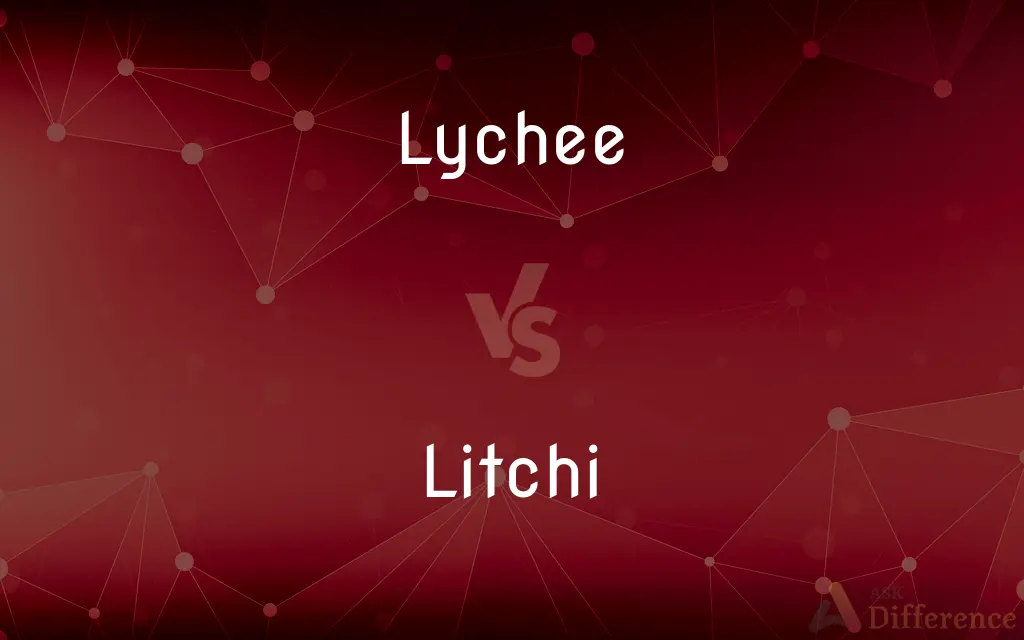Lychee vs. Litchi — What's the Difference?
By Fiza Rafique & Maham Liaqat — Updated on March 27, 2024
Lychee, a tropical fruit with a sweet, floral taste, contrasts with Litchi, the same fruit but different in name, highlighting regional naming variations.

Difference Between Lychee and Litchi
Table of Contents
ADVERTISEMENT
Key Differences
Lychee, originating from China, is known for its fragrant and sweet flavor, encased in a rough, red outer skin. This fruit has been a part of Chinese culture and cuisine for thousands of years, revered not just for its taste but also for its supposed health benefits, including boosting the immune system and aiding digestion. On the other hand, Litchi, essentially the same fruit, sees its name variation more commonly used in certain English-speaking countries and scientific contexts. This difference in naming does not reflect a difference in the fruit itself but rather illustrates the diversity in language and the influence of regional dialects on the English language.
Both lychee and litchi are rich in vitamins and minerals, particularly vitamin C, which is crucial for skin health and immune function. While lychee is often consumed fresh, peeled, and pitted, litchi can also be found in various processed forms, such as canned, dried, or as a flavoring in beverages and desserts. The nutritional content remains similar regardless of the name, making both a healthy choice for those looking to add exotic fruits to their diet.
In terms of cultivation, lychee trees require a specific climate to thrive, ideally a humid and tropical environment with a short, dry, and cool winter. Litchi cultivation follows the same requirements, emphasizing the fruit's sensitivity to the environment and the need for careful management to ensure a bountiful harvest. This similarity further confirms that the differences between lychee and litchi are nominal, with both terms referring to the same delightful fruit.
The commercial market for lychee and litchi shows a growing demand worldwide, fueled by an increasing interest in exotic and tropical fruits. While "lychee" might be the more commonly recognized term in consumer markets, "litchi" is equally accepted, especially in academic and research circles. This dual naming convention does not complicate the fruit's marketability but rather reflects the global nature of its appeal and consumption.
Comparison Chart
Name Origin
Chinese
Same, with variation in English spelling
ADVERTISEMENT
Taste
Sweet, floral
Identical to lychee
Consumption
Fresh, peeled, and pitted
Also available canned, dried, or as flavor
Cultivation
Requires humid, tropical climate
Same requirements
Market Name
More commonly used in consumer markets
Preferred in scientific contexts
Compare with Definitions
Lychee
A tropical fruit with a sweet, floral taste and a rough, red outer skin.
The lychee's fragrant aroma makes it a popular choice for exotic fruit salads.
Litchi
Same as lychee, known for its sweet taste and nutritional value.
Litchis are a delicious snack, easily enjoyed by peeling off the outer layer.
Lychee
Rich in vitamin C, aids in immune system support and digestion.
Consuming lychees may help improve skin health due to their high vitamin C content.
Litchi
Available in fresh, canned, and dried forms, versatile in recipes.
Dried litchis offer a sweet, chewy treat, different from their fresh counterpart.
Lychee
Thrives in a specific climate with a short, dry winter.
Lychee trees are meticulously cared for to ensure a fruitful harvest.
Litchi
Valued across various cultures for its delicious flavor and health properties.
Litchi festivals celebrate the harvest of this cherished fruit in many parts of the world.
Lychee
Often eaten fresh but can also be found canned or as a flavoring.
Lychee juice is a refreshing tropical drink enjoyed on hot summer days.
Litchi
Grows under similar conditions as lychee, with careful climate management.
Litchi orchards are a common sight in regions with the ideal tropical climate.
Lychee
Has been a part of Chinese culture and cuisine for thousands of years.
Lychees are often celebrated in Chinese festivals for their symbolic meaning of love and abundance.
Litchi
Provides a good source of vitamins, especially vitamin C.
Adding litchis to your diet can boost your daily intake of important nutrients.
Lychee
Lychee (US: LEE-chee; UK: LIE-chee; Litchi chinensis; Chinese: 荔枝; pinyin: lìzhī; Jyutping: lai6 zi1; Pe̍h-ōe-jī: nāi-chi) is the sole member of the genus Litchi in the soapberry family, Sapindaceae. It is a tropical tree native to the Guangdong and Fujian provinces of southeastern China, where cultivation is documented from the 11th century.
Litchi
Variants of lychee.
Lychee
An evergreen tree (Litchi chinensis) native to China, cultivated for its bright red fruits with sweet white pulp surrounding a large seed.
Litchi
Synonym of lychee
Lychee
The fruit of this tree.
Litchi
The fruit of a tree native to China (Nephelium Litchi). It is nutlike, having a rough but tender shell, containing an aromatic pulp, and a single large seed. In the dried fruit which is exported the pulp somewhat resembles a raisin in color and form.
Lychee
The dried fruit of this tree. Also called lychee nut.
Litchi
A genus of East Indian sapindaceous trees consisting of a single species (Litchi Chinensis, syn. Nephelium Litchi) which bears the litchi nut.
Lychee
The Chinese tropical fruit tree Litchi chinensis, of the soapberry family.
Litchi
Chinese tree cultivated especially in Philippines and India for its edible fruit; sometimes placed in genus Nephelium
Lychee
That tree's bright red oval fruit with a single stone surrounded by a fleshy white aril.
Litchi
Chinese fruit having a thin brittle shell enclosing a sweet jellylike pulp and a single seed; often dried
Lychee
A soft pink-red colour, like that of a lychee rind (also called lychee red).
Lychee
See Litchi.
Lychee
Chinese fruit having a thin brittle shell enclosing a sweet jellylike pulp and a single seed; often dried
Common Curiosities
What are the health benefits of consuming lychee/litchi?
Both are rich in vitamin C and other nutrients, beneficial for immune health, digestion, and skin health.
How should lychees/litchis be stored for maximum freshness?
They should be stored in a cool, dry place and can be refrigerated to extend freshness.
Are there any risks associated with consuming lychees/litchis?
Consuming them in moderation is generally safe, but overconsumption can lead to stomach upset in some individuals.
What is the main difference between lychee and litchi?
The main difference is in the name; both terms refer to the same fruit, with "lychee" being more commonly used in some English-speaking regions, and "litchi" in others.
How long does it take for a lychee/litchi tree to bear fruit?
It can take 3-5 years for a lychee/litchi tree to start producing fruit.
What dishes can be prepared using lychees/litchis?
They can be used in fruit salads, desserts, cocktails, and savory dishes.
Can lychee and litchi be used interchangeably in recipes?
Yes, since they refer to the same fruit, they can be used interchangeably in recipes.
Can lychees/litchis be eaten raw?
Yes, they are commonly eaten raw after being peeled and pitted.
What makes lychee and litchi popular in tropical regions?
Their sweet, refreshing taste and high vitamin C content make them popular in tropical climates.
Can lychees/litchis be grown in non-tropical climates?
They generally require a tropical or subtropical climate, but with proper care, they can be grown in greenhouses in cooler climates.
Is there a difference in taste between lychees and litchis?
No, there is no difference in taste; both terms refer to the fruit with a sweet, floral flavor.
How are lychees/litchis harvested?
They are handpicked from trees when they turn a vibrant red color, indicating ripeness.
Share Your Discovery

Previous Comparison
Gawk vs. Gawp
Next Comparison
Contrary vs. ContrastAuthor Spotlight
Written by
Fiza RafiqueFiza Rafique is a skilled content writer at AskDifference.com, where she meticulously refines and enhances written pieces. Drawing from her vast editorial expertise, Fiza ensures clarity, accuracy, and precision in every article. Passionate about language, she continually seeks to elevate the quality of content for readers worldwide.
Co-written by
Maham Liaqat













































